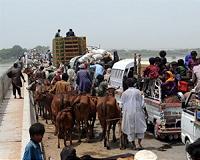| . |  |
. |
Bilawalpur, Pakistan (AFP) Aug 26, 2010 On a sprinkling of land somehow spared the devastating flood of the river Indus, Pakistani peasants in rags rush towards army boats hoping to take them across the muddy waters to safety. The villagers of Bilawalpur in southern Pakistan have survived the monsoon floods but are totally cut off and remain in the grasp of abject poverty. After landing by boat, General Shawkat Iqbal, impeccably turned out in his tan-coloured uniform glistening with medals, takes a megaphone to address the crowd in front of the mosque. Behind him, the fertile plain of Jamshoro is engulfed by muddy brown waters. "We've brought boats to take you away. Will you come with us?" asks Iqbal, the commander of military forces in the area. "No," replies the crowd in chorus as they stand in line in front of him, waiting for the stocks of food rations being dished out by his troops. It's been three weeks since the Indus, just 10 kilometres (six miles) away, let loose by torrential rains, broke from its river bed and swept away entire villages and left Bilawalpur surrounded by five feet of water. If the waters had risen just one or two metres higher, the village would have been wiped off the map, like thousands of other enclaves of mud and stones. The authorities have sent soldiers, police, community leaders and clan leaders to encourage the population to flee. "Some -- 1,000 out of 2,500 - have left, but most people have stayed. They didn't want to listen at all," says Sayed Atahullah Shah, a district official. Those who remain looked worn from their struggle to survive -- some 150 men begging for supplies, rake thin and dirty, beaten by the 45 degree humid heat. They fought on hungry, waiting for night to come when they could break their Ramadan fast with a bare minimum of food. Despite that, nothing would make them leave in the army's chartered canoes. For these poor farmers earning their living from Sindh's fertile plains, the prospect of exile to a nearby refugee camp is frightening. "In the camps, there is no food or aid. The authorities have no respect for human dignity," says Muhammad Juman, 41. The idea of joining the flood of displaced families heading further south to Karachi -- an urban monster of 17 million people -- is even worse. "The cities are dirty, life is too expensive. We cannot live there decently," says Haji Gulam. The army forced no one to leave. The water level around the village has dropped slightly and if the weather stays dry, the village will be saved. That does not mean the residents of Bilawalpur will have been spared. The waves have washed away the cotton they were preparing to harvest, their fertilizer and seeds. The water will take at least a month to recede completely and it may be too late to plant winter wheat, compounding the humanitarian crisis facing huge swathes of the country. The army is anxious -- it cannot maintain its food lifeline indefinitely. Since the first heavy rains began in the north a month ago, 20 percent of Pakistan's land has been submerged by water, more than 17 million Pakistanis are affected, of which eight million are in need of urgent aid, the UN says. And more than five million require shelter. Leaving the "island" of Bilawalpur in his small boat, the usually optimistic military spokesman for the region, Colonel Asad Ahmad Jalali, sounds a darker note when asked about the prospects for the region's farmers. "They may well be very hungry in the coming months," he says.
Share This Article With Planet Earth
Related Links Bringing Order To A World Of Disasters When the Earth Quakes A world of storm and tempest
 Pakistan orders nearly half a million to evacuate
Pakistan orders nearly half a million to evacuateThatta, Pakistan (AFP) Aug 27, 2010 Flood-ravaged Pakistan ordered nearly half a million people to evacuate towns Thursday as the United Nations vowed to forge ahead with relief operations despite threats against foreign aid workers. Torrential monsoon rains triggered massive floods affecting a fifth of the volatile country - an area roughly the size of England - where US officials have reported threats by the Taliban. B ... read more |
|
| The content herein, unless otherwise known to be public domain, are Copyright 1995-2010 - SpaceDaily. AFP and UPI Wire Stories are copyright Agence France-Presse and United Press International. ESA Portal Reports are copyright European Space Agency. All NASA sourced material is public domain. Additional copyrights may apply in whole or part to other bona fide parties. Advertising does not imply endorsement,agreement or approval of any opinions, statements or information provided by SpaceDaily on any Web page published or hosted by SpaceDaily. Privacy Statement |